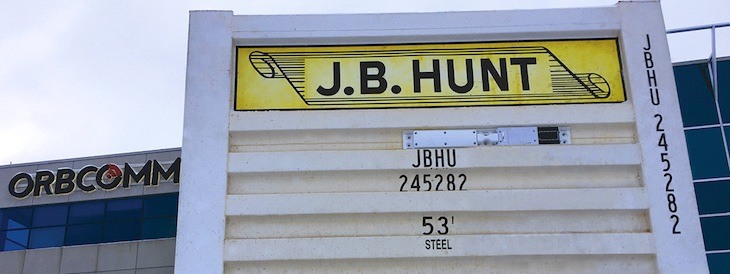J.B. Hunt expected to report 48% earnings rise, 16% revenue increase in fourth quarter
by January 16, 2019 12:34 pm 1,497 views

Lowell-based carrier J.B. Hunt Transport Services’ earnings should rise in the fourth quarter even though peak season was not as strong as expected and intermodal freight volumes were impacted by rail service issues, analysts said.
J.B. Hunt plans to release financials after the markets close Thursday (Jan. 17) for the fourth quarter and for 2018, and it’s expected to report fourth-quarter earnings rose 48.5% to $1.50 per share, based on a consensus of 22 analysts. Revenue is expected to increase by 16.1% to $2.31 billion. For 2018, earnings per share are expected to increase by 49.6% to $5.40 per share, and revenue is projected to rise by 19.7% to $8.6 billion.
In an earnings preview, analysts Brad Delco and Justin Long and associates Scott Schoenhaus and Brian Colley, all of Little Rock-based Stephens Inc., maintained a buy rating for company shares and a 12-month target price of $118 and lowered estimates for the company.
“In short, we believe peak season was a little more orderly than expected, or said another way, demand was a little softer than expected,” according to Delco, Long, Schoenhaus and Colley. “We believe (Dedicated Contract Services) continues to onboard new business while start-up costs are moderating.”
The company recently purchased New Jersey-based carrier Cory 1st Choice Home Delivery for $100 million as an investment into final mile delivery of bulky items, including furniture. J.B. Hunt’s Final Mile division is a part of the company’s Dedicated Contract Services segment. In 2017, J.B. Hunt spent $136 million to buy Houston-based carrier Special Logistics Dedicated. The 2017 deal was the first time in 26 years that J.B. Hunt had acquired another company.
The Dedicated Contract Services segment accounted for 25% of the company’s revenue and 20% of its operating income in the third quarter of 2018. The segment’s success in acquiring new dedicated contracts is expected to lead to improved earnings results for 2019, and margins should rise 120 basis points, from the previous quarter, according to Delco, Long, Schoenhaus and Colley. Revenue in the segment should rise in the first half of 2019 and margins should improve in the second half of 2019.
The intermodal segment accounted for the largest share of the company’s revenue and income, 55% and 69%, respectively, in the third quarter of 2018. Rail service issues, especially in the West, continued to put pressure on freight volumes in the intermodal segment, and a pull-forward of freight in the fourth quarter didn’t happen as expected, according to Delco, Long, Schoenhaus and Colley. They expect freight volume to be flat, and they had previously expected it to rise 2%. Margin estimates were changed as a result of a “more challenged pricing environment” and the “unknown” impact of the arbitration with Fort Worth, Texas-based BNSF Railway Co. Investors have been hesitant to invest into the carrier until the arbitration is completed.
Revenue in the carrier’s brokerage segment, Integrated Capacity Solutions, is expected to rise 12% as lower fuel prices and tougher comparisons to the strong periods in 2017 and 2018 are expected to impact growth. Gross margins should be flat from the previous quarter at 15.5% because contract prices have remained while the cost of securing capacity has fallen, according to Delco, Long, Schoenhaus and Colley. Margins are expected to exceed normal seasonal levels.
In the trucking segment, margins are expected to rise 20 basis points from the previous quarter, and this is less than the normal seasonal improvement of about 60 basis points. Truckload demand moderated in the fourth quarter, from the summer, but loads still exceeded capacity over the period.
Shares of J.B. Hunt (NASDAQ: JBHT) closed Tuesday (Jan. 15) at $97.08, down 93 cents or 0.95%. In the past 52 weeks, the stock has ranged between $131.74 and $88.38.
